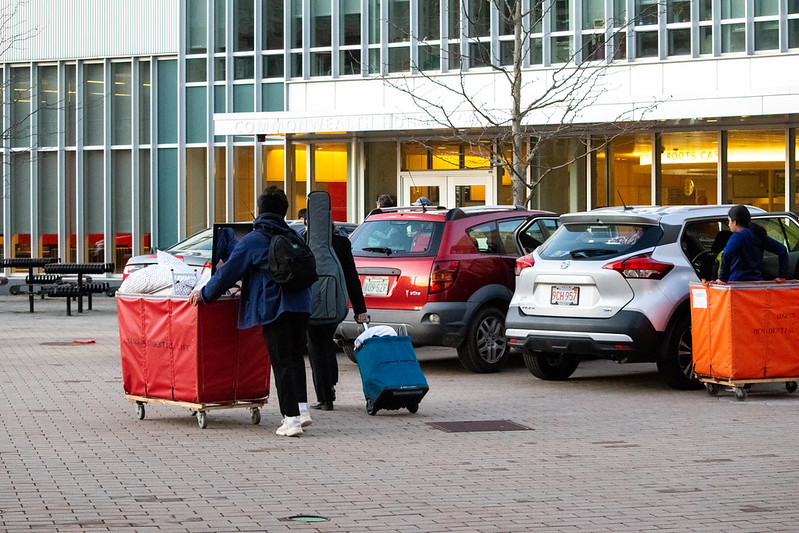The COVID-19 pandemic has significantly impacted the lives of many people across the country and world at various levels. The sudden end to the semester at the University of Massachusetts and countless other universities has been received by students with both disappointment and understanding.
“I was incredibly sad that our semester was coming to an end, I felt like we had so much more time to grow and learn in our first year of college. I wanted more time with the people I came to love and more time to meet others,” said freshman Caelin Molloy.
The seniors feel a particular sense of dismay; “To me, this meant that my entire world had been flipped upside down and I would not be graduating under normal circumstances,” said senior economics major Tauqeer Hassan.
“My immediate thought went to not being able to spend the last moments of my senior year with my friends,” said another senior, Ellen Aron, in reaction to hearing the news.
With Massachusetts Governor Charlie Baker urging people to practice social distancing, necessary in order to ease the spread of the disease and not overwhelm the healthcare system, students are now completing the semester online and spending the majority of their time at home away from others.
It may feel difficult to remain positive throughout all of this. The prolonged social isolation, in combination with medical and financial worries caused by the pandemic, may exacerbate existing mental health issues and be detrimental to one’s overall mental health. However, there are countless ways that students are patiently and effectively coping with the current situation while still maintaining safe practices.
With a lack of a daily structure and a continuous news cycle that often weighs heavy on the mind, students have also found it difficult to stay motivated. Aachal Gunda, a sophomore environmental science and biology double major, believes “it’s important to get away from the news and phones while in social isolation…. getting buried into negative news can really bring you down.”
Emily Lima, a student in the Isenberg School of Management, advises to “follow a schedule similar to [your] college schedule while at home.” This could mean following your regular sleep schedule, attending online classes as they occur and designating the same time to do homework, study and other things you usually would do during school.
There are many productive and enjoyable things you can do while in quarantine; read the book you’ve been putting off, write that story you’ve always wanted to, practice a recipe, edit some pictures, play card games with your family, rearrange your room, meditate or pray, start some art projects or learn a new language. Take the time to take care of yourself—physical activity and time outdoors is also important; go for a walk or run, ride your bike or skate around the neighborhood or play sports with a family member. These are just a few of the things that students have been spending their time doing.
Molloy stated that she spends her time “Walking [her] dog, going for bike rides and carving out time in the day for alone time.”
Freshman Lily Berube enjoys “Watching TV, painting, driving to the beach, reading, cleaning and baking with [her] mom.”
“I think this could be a good time to explore your hobbies,” said Isenberg student Mary Jordan, who has been spending some of her time “upcycling and sewing new clothes.” But, remember that “you don’t have to be doing something productive all the time; it’s okay to take some time to yourself,” she said.
Confined to their homes, many students have expressed that they miss the sense of community and the social aspects of campus life—being able to go to late night at the dining commons, hockey games, the library or just walk down the hall to talk to a friend.
Oftentimes in moments of such chaos and uncertainty, people rely on each other for comfort, and experts say that some form of socializing is necessary for your mental health. However, this pandemic carves out a unique situation. The CDC recommends that you still “connect with others” during this time to reduce stress – this can be done through time with family and online communication.
“I try to FaceTime a friend at least once a day,” said Berube.
Many are also using Zoom, the video communication platform that is often used for online classes, to talk to each other and even watch a movie together. Others are taking the time to reach out to a distant friend or family member. Another activity many have been doing is gathering their cars in a parking lot at a safe distance and catching up, listening to music and watching the sunset.
Countless students have also voiced that this pandemic has been a time for reflection.
“I was forced to look back and reflect on my life this year at UMass, a little earlier than expected, and I realized how truly blessed I was,” said Molloy.
Maitreya Marathe, a junior, realized the need “to live more in the moment…no one thought the semester was going to cut short, so I was taking a lot of things for granted.”
Many students echo a similar sentiment; this situation has made them realize the things they have neglected to value—their own and their loved ones’ health and the ability to go outdoors and spend time with others. It has inspired them to make the best of the finite time that they have and take every opportunity as it is presented rather than pushing it off into an uncertain future.
It has also encouraged students to be aware of the events outside of their immediate surroundings and the greater impacts of this virus.
“I learned to not ponder on my small inconveniences when other people are suffering at large from this pandemic,” says Aron.
This has been difficult for the local community and the globe, but it has also been a time of resilience and solidarity. We will eventually get through this, but there is a lot that we can do in the meantime.
Saliha Bayrak can be reached at [email protected].




















